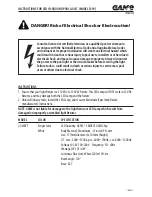
ENGLISH
47
6 SELECTING THE PREFERRED MODES (MENU)
A rapid and intuitive menu system gives access to the various modes, allowing you to activate and configure them as
desired.
6.1 Menu access and navigation
The menu is accessed by pressing the “
ENTER
” key [
] when the item “Configuration”
is selected in the bar
at the bottom of the homepage (par. 3.2).
The complete structure of the menu, with all the items of which it is composed, is shown in paragraph 6.2.
6.1.1 Appearance and opening page of the menu
When you enter the menu, the opening page appears, as in the figure:
1.
2.
3.
4.
Figure 12
The page contains these elements:
1. The line at the top shows the page title, in this case “Menu”.
2. The bar on the left indicates in what position we are with respect to the extension of the menu; in this case we
are at the start and the internal sign is at the top end.
3.
The centre of the page contains a part of the list of items that make up the menu, which we can scroll through
with the arrow keys (
up
and
down
); the item on which we are positioned is highlighted by the flashing box
(dotted in the figure). The previous menu item (at the top) and the next item (at the bottom) are also shown.
4.
The line at the bottom indicates which keys can be used on the page, as well as the arrows (not shown for
simplicity). In this case we can press
ESC
” [
] to leave, or “
ENTER
” [
] to access the selected item.
The following figure shows how the display changes when the
down arrow
key is pressed.
Figure 13
Now the flashing box (dotted here) highlights the item after the one in the previous situation; in the vertical bar on the
left, the internal sign is lower down, showing that we are positioned farther down the items that make up the menu.
When we press the up arrow key, we return to the situation in the previous figure.
The list of items in the menu should by considered as cyclical, that is as a loop: from the last item it returns to the first
with the
down
arrow
key. And from the first item it goes to the last with the
up
arrow
key.
The complete structure of the menu is shown in paragraph 6.2.
6.1.2 Access to a sub-menu
When some items on the menu are accessed, a further menu, or sub-menu, may open.
This happens, for example, on the initial page of the menu, shown above:
















































